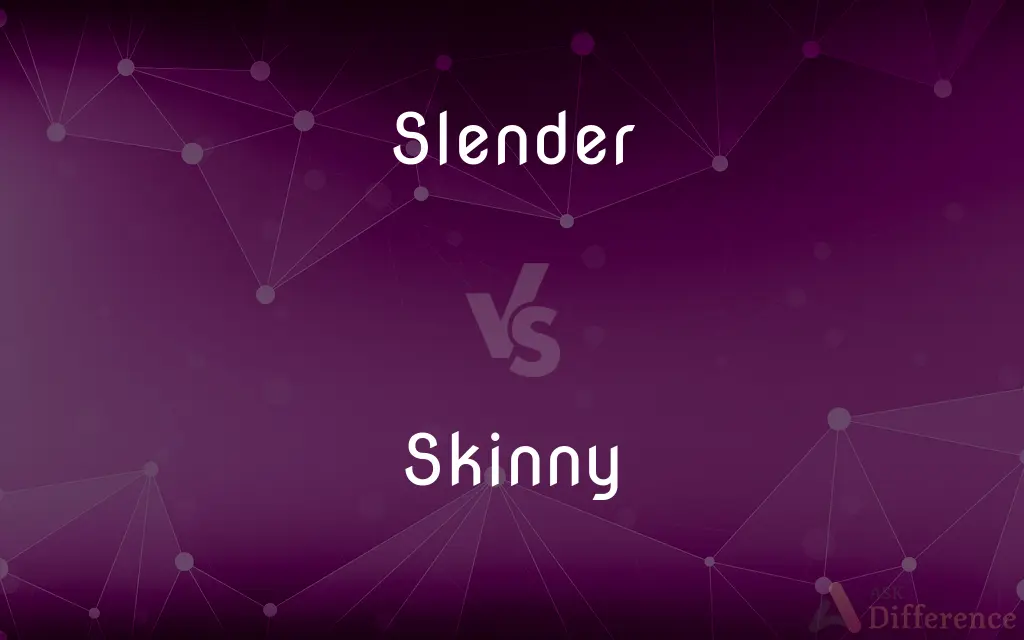Slender vs. Skinny — What's the Difference?
By Maham Liaqat & Urooj Arif — Updated on March 15, 2024
Slender refers to a gracefully thin figure, often perceived as elegant, while skinny implies a lack of body fat and muscle, sometimes suggesting frailty.

Difference Between Slender and Skinny
Table of Contents
ADVERTISEMENT
Key Differences
Slender is often associated with a gracefully thin physique, suggesting elegance and proportion. It's a term that conveys attractiveness and a balanced body shape without excess weight. On the other hand, skinny implies a more extreme thinness that might lack muscle tone and suggest frailty or undernourishment. It's often used in a less flattering context, highlighting a possible lack of health or strength.
The perception of slenderness often comes with positive connotations, such as fitness and health, indicating a well-maintained body. Slender figures are typically desired in fashion and beauty industries for their aesthetic appeal. Whereas, being skinny can carry negative implications, such as poor health or inadequate nutrition, and might not be as celebrated in social contexts.
Slenderness is usually considered a result of genetics or a healthy lifestyle, including balanced diet and regular exercise. It reflects a body type that maintains thinness naturally or through conscious health choices. Conversely, skinniness can sometimes result from an unhealthy lifestyle, medical conditions, or extreme dieting, and might not always be a choice.
In terms of fashion, slender individuals often find it easier to wear a wide range of styles that complement their body shape. Designers frequently design clothes with the slender body type in mind, making it a sought-after physique in the modeling world. Skinny individuals, however, might struggle to find clothes that fit well, as extreme thinness can lead to a lack of definition and curves, making certain styles less flattering.
Culturally, slenderness is often idealized and associated with beauty standards, especially in Western societies where it is linked to attractiveness and desirability. Skinny, by contrast, might not hold the same cultural esteem and can sometimes be viewed critically, especially if it appears to stem from unhealthy habits.
ADVERTISEMENT
Comparison Chart
Connotation
Positive, elegant
Negative, frail
Perception
Healthy, fit
Undernourished, weak
Lifestyle Implication
Balanced diet, exercise
Possible unhealthy habits
Fashion Compatibility
High, versatile
Limited, specific styles
Cultural View
Often idealized
Sometimes criticized
Compare with Definitions
Slender
Slender refers to being gracefully thin, with a connotation of elegance and proportionality.
The dancer's slender frame allowed her to move with remarkable grace and fluidity.
Skinny
Skinny denotes a level of thinness that suggests a lack of body fat and possibly muscle, often carrying a negative or neutral connotation.
The abandoned puppy was so skinny that every rib was visible, prompting immediate rescue and care.
Slender
Slender is used to describe something that is thin in a way that is perceived as positive or desirable.
The bridge was admired for its slender arches, which combined strength with beauty.
Skinny
Skinny is used in informal contexts to refer to insider information or the essential facts of a situation.
Give me the skinny on the new project; I've heard it's going to be groundbreaking.
Slender
Slender often describes objects or features that are narrow and elongated, suggesting a refined or delicate structure.
The slender pillars supported the grand structure without overwhelming its aesthetic.
Skinny
Skinny is often used colloquially to describe the minimal or reduced version of something, such as a beverage with fewer calories.
She ordered a skinny latte, preferring the version with skim milk and no whipped cream.
Slender
Slender implies a figure that is slim in an attractive and healthy-looking manner.
The slender silhouette of the tree against the sunset was breathtaking.
Skinny
Skinny can refer to items or clothing that are very tight-fitting, emphasizing the thinness of the form.
Skinny jeans have become a staple in fashion, known for their tight fit from waist to ankle.
Slender
Slender can also signify a small amount or degree, often in the context of chances or resources.
They had only a slender lead in the game, keeping everyone on the edge of their seats.
Skinny
Skinny can imply being underweight or thin to a point where it might raise concerns about health and well-being.
Concerns were raised about the actor's skinny appearance for his latest role, sparking discussions about health in the industry.
Slender
(of a person or part of the body) gracefully thin
Her slender neck
Skinny
Having very little bodily flesh or fat, often unattractively so; very thin.
Slender
(of something abstract) barely sufficient in amount or basis
People of slender means
A slender majority of four
Skinny
(informal) thin, generally in a negative sense (as opposed to slim, which is thin in a positive sense).
Her recent weight loss has made her look rather skinny than slender
Slender
Having little width in proportion to height or length; long and thin
A slender rod.
Skinny
Having reduced fat or calories.
Slender
Thin and delicate in build; gracefully slim
"She was slender as a willow shoot is slender—and equally graceful, equally erect" (Frank Norris).
Skinny
Naked; nude (chiefly used in the phrase skinny dipping).
Slender
Small in amount or extent; meager
Slender wages.
A slender chance of survival.
Skinny
(of clothing) tight-fitting
Skinny jeans
Slender
Thin; slim.
A rod is a long slender pole used for angling.
Skinny
(golf) thin
Slender
(figurative) meagre; deficient
Being a person of slender means, he was unable to afford any luxuries.
Skinny
(colloquial) The details or facts; especially, those obtained by gossip or rumor.
She called to get the skinny on the latest goings-on in the club.
Slender
(Gaelic languages) Palatalized.
Skinny
A state of nakedness; nudity.
Slender
Small or narrow in proportion to the length or the height; not thick; slim; as, a slender stem or stalk of a plant.
She, as a veil down to the slender waist,Her unadorned golden tresses wore.
Skinny
(informal) A low-fat serving of coffee.
Slender
Weak; feeble; not strong; slight; as, slender hope; a slender constitution.
Mighty hearts are held in slender chains.
They have inferred much from slender premises.
The slender utterance of the consonants.
Skinny
(nonstandard) A skinny being.
Slender
Moderate; trivial; inconsiderable; slight; as, a man of slender intelligence.
A slender degree of patience will enable him to enjoy both the humor and the pathos.
Skinny
(transitive) To reduce or cut down.
Slender
Small; inadequate; meager; pitiful; as, slender means of support; a slender pittance.
Frequent begging makes slender alms.
Skinny
Consisting, or chiefly consisting, of skin; wanting flesh.
He holds him with a skinny hand.
Slender
Spare; abstemious; frugal; as, a slender diet.
The good Ostorius often deignedTo grace my slender table with his presence.
Skinny
Confidential information about a topic or person;
He wanted the inside skinny on the new partner
Slender
Uttered with a thin tone; - the opposite of broad; as, the slender vowels long e and i.
Skinny
Having unattractive thinness;
A child with skinny freckled legs
A long scrawny neck
Slender
Being of delicate or slender build;
She was slender as a willow shoot is slender
A slim girl with straight blonde hair
Watched her slight figure cross the street
Slender
Very narrow;
A thin line across the page
Slender
Having little width in proportion to the length or height;
A slender pole
Slender
Small in quantity;
Slender wages
A slim chance of winning
A small surplus
Slender
Gracefully slender; moving and bending with ease
Common Curiosities
What is the main difference between slender and skinny?
Slender implies a graceful, proportional thinness, whereas skinny suggests extreme thinness that may indicate lack of health.
Can a person's lifestyle influence whether they are slender or skinny?
Yes, a balanced diet and regular exercise can contribute to a slender figure, while unhealthy habits might lead to being skinny in an unhealthy way.
Can slender and skinny be used interchangeably?
No, because slender has a positive connotation of elegance and health, while skinny often implies a less desirable level of thinness.
Is it better to be described as slender or skinny?
Generally, being described as slender is more favorable due to its association with health and attractiveness.
Do slender and skinny have the same implications in fashion?
Not exactly. Slender is often idealized in fashion, while skinny might not always fit the desired aesthetic due to potential lack of curves or muscle tone.
Can skinny people be healthy?
Yes, some people are naturally skinny and can be healthy if they maintain a balanced diet and regular physical activity.
Is the fashion industry more favorable towards slender or skinny models?
The fashion industry tends to favor slender models for their ability to showcase a wide range of designs effectively.
Are there specific diets associated with maintaining a slender figure?
Balanced diets focusing on nutrition and moderation are commonly associated with maintaining a slender figure.
Does being slender guarantee physical fitness?
Not necessarily, as physical fitness involves strength, endurance, and flexibility, not just body shape.
Is the perception of slender and skinny influenced by cultural factors?
Absolutely, cultural factors heavily influence the perception and desirability of being slender or skinny.
Can men be described as slender or skinny?
Yes, men can also be described as slender or skinny, with similar connotations as when describing women.
Are there any health risks associated with being skinny?
Yes, being too skinny can indicate undernourishment or health issues, leading to potential risks like weakened immunity or bone density loss.
Do societal views on slender and skinny differ?
Yes, slenderness is often viewed positively and associated with beauty standards, whereas skinniness can be viewed negatively if perceived as resulting from unhealthy practices.
Do slender and skinny have the same implications across all ages?
The implications can vary with age, as concerns about health and aesthetics change over a person's lifespan.
Can skinny individuals gain weight to become slender?
Yes, with proper nutrition and exercise, skinny individuals can gain muscle and healthy weight to achieve a more slender appearance.
Share Your Discovery

Previous Comparison
Idiocracy vs. Idiocy
Next Comparison
Balsa vs. PlywoodAuthor Spotlight
Written by
Maham LiaqatCo-written by
Urooj ArifUrooj is a skilled content writer at Ask Difference, known for her exceptional ability to simplify complex topics into engaging and informative content. With a passion for research and a flair for clear, concise writing, she consistently delivers articles that resonate with our diverse audience.
















































